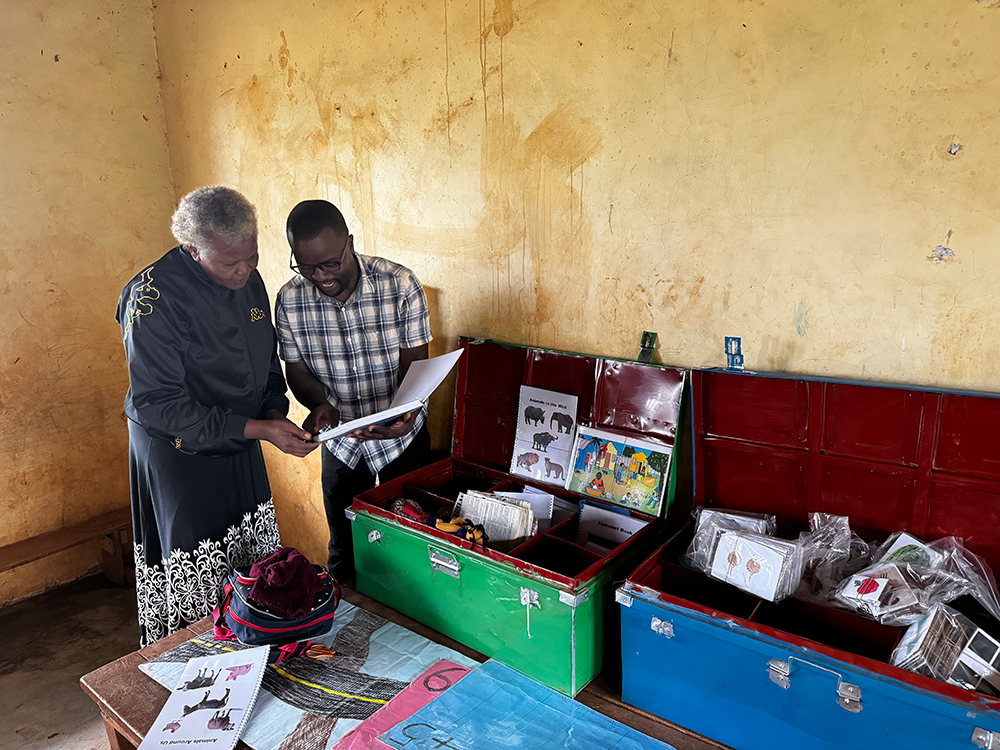EGC Incubation Fund offers flexible pilot funding to promising projects by Yale researchers and collaborators
A new resource at the Economic Growth Center enables Yale researchers, students and in-country collaborators to take advantage of high-potential, time-sensitive opportunities for impact.

New EGC Incubation Fund supports unique opportunities for impact at Yale
by Adena Spingarn
The Economic Growth Center’s new Incubation Fund aims to support researchers, with a focus on junior faculty and students, in the Yale development economics community in the early stages of high-potential, time-sensitive, policy-focused research and project collaborations, by providing seed funding to get promising ideas off the ground. As EGC Director Rohini Pande noted, "For development economists, opportunities for innovative, high-potential research and other forms of collaboration might emerge quickly – and then disappear before traditional sources of funding can be secured."
“In our work, opportunities arise which are not able to be covered through traditional sources of research funds but where a relatively small, immediate investment can bring large returns,” said Deanna Ford, Managing Director of Yale Inclusion Economics, based at the Economic Growth Center (EGC) and the Macmillan Center at Yale University, and Senior Adviser at EGC. “The Incubation Fund aims to target these opportunities where a small amount of flexible funding can unlock the potential for much larger gains in research, collaboration, or policy impact.” The EGC Incubation Fund was established in early 2023 and, with the initial set of resources raised, has made five investments to date.
Building on EGC’s data access initiative, one set of EGC Incubation Fund investments is in early stage research led by EGC junior faculty affiliates where there was an opportunity to create a data product that is useful for a broader set of researchers or policy stakeholders.
Processing data on product entry to international markets
Diana Van Patten, Assistant Professor of Economics at the Yale School of Management and an EGC affiliate, received an Incubation Fund grant so that she and her collaborators could quickly advance on the opportunity to begin processing a proprietary data set with wide-ranging information about the entry of new products to several dozen national markets. This data, which has been collected since the 1990s but not yet used by economics researchers, can provide valuable insights about how products enter markets and how innovation and technological diffusion occur around the world. Preliminary results from this early stage enabled Van Patten’s team to make a successful case for additional funding from the Yale School of Management to expand to a full-scale project.
Van Patten said that the fund fills a gap in economics research funding at Yale, which previously offered opportunities mainly for US-based projects. “It’s filling a void that is particularly useful for all the researchers who are trying to explore topics related to low-income countries,” she said. “[EGC funding] let us start working almost immediately as opposed to waiting and going through the process for a larger grant to start exploring the data.”
Measuring the effect of subsidized trade fair attendance
Funding came at a similarly crucial moment for Lauren Falcao Bergquist, Assistant Professor of Economics and Global Affairs and an EGC affiliate, in her research on how trade fairs help small firms develop business relationships with larger ones and gain exposure to new technologies that allow them to expand. After a small pilot program at an agricultural technology fair, Bergquist and her collaborators had an opportunity to conduct a randomized controlled trial measuring the effect of subsidized attendance at a major international fisheries trade fair in Chile. But they didn’t have the financial resources to subsidize vendor attendance at the fair or to send a team to the country to conduct surveys.
“The EGC funding has been totally critical,” she said. “They have enabled us to go out and recruit and find these small-scale firms and pay for subsidies.” With this funding, Bergquist and her collaborators maintained momentum with the survey while applying for traditional research funding, which they received just two weeks before the trade conference and which allowed them to expand the project.

Members from the Yale research team attending the trade fair in Chile. Photo by Viyaleta Farysheuskaya.
Eliciting workers’ valuation of formal and informal employment
Mayara Felix, a Cowles Foundation Postdoctoral Associate who will join the Yale faculty in July 2024, received an Incubation Fund grant to launch a novel data collection effort in Brazil on how workers value various aspects of their employment beyond financial compensation. Workers in low- and middle-income countries are often self- or informally employed, but because existing surveys tend to skew towards higher-income countries and workers, it is unclear whether this kind of employment improves or reduces the welfare of poorer workers compared to formal employment. Informal and self-employment also do not easily fit into traditional models of wage-setting, which are used to infer the degree of market power firms have over workers. Felix’s survey brings to light crucial but often overlooked insights about how poorer workers value their labor, with important implications for whether or not governments should address self-employment.
Felix hopes to continue and expand the scope of these new “Employment Valuation Surveys,” creating a publicly available research product that fills a critical gap and that will inform policies addressing self-employment and informality. The Incubation Fund, she said, “allows us to take risks, to be creative, to do something ambitious at this early stage.”
Capacity building of local collaborator leading pre-school intervention in Kenya research project
The Incubation Fund also supported the expansion of an early childhood education program in Kenya by providing bridge funding for the first semester of a subsidized, remote doctoral studies program for the project’s field intervention lead, Brian Murithi Humphrey. This PhD training is expanding Brian’s knowledge of child development, intervention design, and embedded project evaluation as he leads the deployment and refinement of the core project intervention among around 1,400 children in Tharaka Nithi County in rural Kenya. This opportunity has increased locally led research capacity on the project as it expands from a six-month pilot to a 118-school randomized controlled trial that allows children to attend preschool with a child-centered, locally adapted curriculum starting at age three. The grant allows time for the team to secure funding for the remainder of Humphrey’s doctoral study, while also pursuing funding to enable the expansion of the study to capture longer term effects. Looking ahead, the team expects that the PhD will further Humphrey’s abilities as a local leader in the design, implementation, and scaling up of early childhood interventions in the county and potentially across Kenya, and help him become a recognized resource across East Africa for replacing rote learning with play-based education in a child-friendly environment.

Brian Murithi Humphrey discussing curriculum materials with intervention mentor, Rose Karimi Nyaga. Photo by EGC.
“I believe the PhD program will give me an opportunity to venture deep into those strategies and methodologies of handling children that will make me better and better, not only in ensuring that this project is successful, but in the future, helping children and my community,” Humphrey said. The overall research project evaluating the intervention through a randomized controlled trial in partnership with the Tharaka Nithi County government, Kenyatta University, Bangor University, the University of the West Indies and the Gates Foundation is being co-led by EGC affiliates Costas Meghir and Orazio Attanasio.
Discussion series for economics undergraduates in the United States and Cuba
Finally, in addition to funding opportunities that have arisen in early-stage research, the EGC Incubation Fund supported an undergraduate project proposed by a member of the Salus Populi Foundation student group that was founded by an EGC alum intern in 2022. An opportunity arose for Maya Aidlin-Perlman ’25 to explore a US-Cuba academic exchange in economics education and visit the University of Havana in early 2024, a trip supported by the EGC Incubation Fund. With this funding, she was able to develop a plan with Cuban colleagues for a series of virtual, exploratory conversations between economics undergraduates in the US and Cuba. In Spring 2024, economics undergraduates from Yale and from the University of Havana will pilot this series by meeting virtually three times to discuss a set of topics including the dynamics of US-Cuba relations, key economic challenges post-Covid, healthcare, and education. The opportunity to create this partnership originated while Aidlin-Perlman spent a semester in Cuba through the Consortium for Advanced Studies Abroad (CASA) program and found that the reality was different from the academic perspective she had previously encountered. “In the US, we think of Cuba as having a specific economy, but there are real people behind that,” she said. “We don’t see how Cubans talk about Cuba.”
Aidlin-Perlman has found the support from EGC invaluable both financially, in funding her trip to Cuba, and logistically, in providing guidance on how to launch the program. “If I hadn’t had the EGC support,” she says, “I’m not sure how quickly it could have gotten off the ground, if at all.”
With initial funds raised, EGC will continue identifying and supporting early-stage projects with a high potential for impact. “The Incubation Fund is a flexible mechanism to meet needs as they arise,” Ford said. “The more support we raise for the Incubation Fund, the more of these types of high-potential opportunities we’ll be able to take ahead.”
If you are interested in supporting the EGC Incubation Fund, you can learn more at https://egc.yale.edu/about/support-our-work or reach out directly to Deanna Ford at deanna.ford@yale.edu.